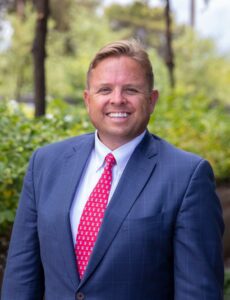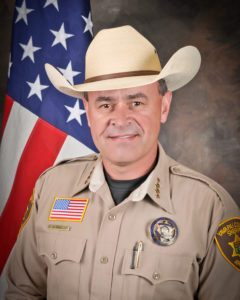SUNLAND PARK, N.M. (AP) — The politics of immigration look different from the back patio of Ardovino’s Desert Crossing restaurant.
That’s where Robert Ardovino sees a Border Patrol horse trailer rumbling across his property on a sweltering summer morning. It’s where a surveillance helicopter traces a line in the sky, and a nearby Border Patrol agent paces a desert gully littered with castoff water bottles and clothing.
It’s also where a steady stream of weary people, often escorted by smugglers, scale a border wall or the slopes of Mount Cristo Rey and step into an uncertain future. It’s a stretch of desert where reports of people dying of exhaustion and exposure have become commonplace.
“It’s very obvious to me, being on the border, that it’s not an open border. It is a very, very, very difficult situation,” said Ardovino, who pays for private fencing topped by concertina wire to route migrants around a restaurant and vintage aluminum trailers that he rents to overnight guests.
“I wish the facts would rule this conversation, and being here, I know they do not.”
As immigration politics have moved to the forefront of this year’s presidential election, they’ve dominated contests across the country for congressional seats that could determine which party controls Congress. But the urgency of the situation is greater in some districts than others.
Three of 11 congressional district races along the southern U.S. border are hotly-contested rematches in districts that flipped in 2022 with the election of Democratic Rep. Gabe Vasquez in New Mexico and Republican Reps. Juan Ciscomani in Arizona and Monica De La Cruz in Texas.
A partner in a decades-old family business, Ardovino lives in one border district in Texas and works in Vasquez’s district in New Mexico. He was disappointed by the collapse in February of a bipartisan border bill in Washington, and he bristles at politicians talking from afar about an “open border.”
What he wants, more than anything, is a collective fix — one that doesn’t diminish the work of border agents or gloss over real-world challenges like migrants fleeing dictators.
“It’s frustrating for people who need a border bill of any kind, any time, to start dealing with the big picture,” Ardovino said. “I’d rather be running a restaurant than working on these fences.”
Democrats touting border solutions
Early voting starts Oct. 8 in Sunland Park, on the edge of a whiplashed congressional district that flipped in 2018, 2020 and again in 2022 with the election of Vasquez.
Democrats in Congress are promoting border enforcement as seldom before, including a half-dozen bills from Vasquez. He touts his knowledge of the region as the U.S.-born son of immigrants with relatives on both sides of the border.
“With migrant activity along the border, we have had to adjust our approach,” said Vasquez. “I can say here that the sky is blue for 50 years, but when it turns red, you have to admit that it’s turning red.”
Here, border politics are literally matters of life and death. Federal and local authorities describe a new humanitarian crisis along New Mexico’s nearly 180-mile portion of the border, where migrant deaths from heat exposure have surged and merciless smuggling cartels inflict havoc.
Where Doña Ana County shares a 45-mile stretch of border with Mexico, the sheriff’s department reported 78 lifeless migrant bodies found between January and mid-August.
“The death toll, in my 21 years of working with the Doña Ana sheriff’s department, we have not had this,” said Major Jon Day.
In the Texas race, Democratic challenger Michelle Vallejo has taken a hard line on border enforcement, shocking progressive allies in her campaign to unseat De La Cruz. A recent ad from Vallejo describes “chaos at the border” and urges bipartisan cooperation to deploy more Border Patrol agents and fight human trafficking cartels.
‘A responsibility to enforce the law’
In Arizona’s 6th Congressional District, Republican incumbent Ciscomani calls border enforcement his No. 1 priority. But he has distanced himself from former President Donald Trump’s sometimes caustic anti-immigrant rhetoric and avoided presidential campaign events in swing-state Arizona. Instead, Ciscomani tells an immigrant’s story — about his own arrival in the U.S. at age 11 from Hermosillo, Mexico. He received citizenship in 2006 and says he is determined to fix the border.
“We have a responsibility to enforce the law on the border, and we also are a community of immigrants — myself included — that came here to this country, and we’re seeking opportunity.”
Experts say voters near the border have tangible concerns about smugglers and contraband but know the benefits of authorized cross-border commerce and commuting.
“There is, I think, more of a nuanced view,” said Samara Klar, a pollster and professor at the University of Arizona School of Government and Public Policy.
Border patrol arrests on the southwest border plunged to a 46-month low in July after Mexican authorities stepped up enforcement and President Joe Biden temporarily suspended asylum processing. But in New Mexico, where the decline has been less pronounced, surging migrant deaths prompted coordinated U.S. law enforcement raids in August on stash houses where smugglers hide migrants.
Vasquez, looking to be the first Democrat to win reelection in New Mexico’s 2nd Congressional District since 1978, has pitched legislation to improve detection of fentanyl coming across the border and to disrupt cartel recruitment of young Americans to ferry migrants to hiding places — quick trips that offer $1,100 — amid a scourge of addiction and proliferation of homeless encampments in cities along the Upper Rio Grande.
But he also has plans to improve conditions at migrant detention centers and offer permanent residency to immigrants who fill critical jobs in the U.S.
Republicans walk a tightrope
Vasquez ousted one-term Republican Congresswoman Yvette Herrell by only 1,350 votes in 2022 after Democrats redrew congressional maps to split a conservative oil-producing region into three districts.
Herrell, seeking the seat for the fourth consecutive time, has described an “absolute chaotic scene” at the border, and joined Republican House leaders in claiming that Democrats undermined U.S. elections by opposing a proof-of-citizenship requirement for new voters.
“It’s one or the other,” Herrell said at a rally in Las Cruces with Republican House Speaker Mike Johnson. “It’s our sovereignty over the open border.”
Noncitizens already are prohibited from voting in federal elections under penalties including prison or deportation, and Vasquez says the new requirement would make participation more difficult for legitimate voters, including Native Americans who couldn’t vote in New Mexico until 1948. Data from states indicate that voting by noncitizens happens — though not in high numbers.
Herrell’s rhetoric on immigration takes aim at voters in a district Trump lost by a roughly 6% margin in 2020.
“It’s a tightrope that she’s got to walk in trying to get any of the pro-Trump enthusiasm,” said Gabriel Sanchez, director of the University of New Mexico Center for Social Policy.
The district’s voting age population is 56% Hispanic — with centuries-old ties to Mexican and Spanish settlement and a smaller share of foreign-born residents than the national average.
“Republicans have been focused more and more on the Hispanic vote because they sense that they can make some inroads,” Albuquerque-based pollster Brian Sanderoff said. “And in fact the Hispanic vote in southeastern New Mexico is split. If you’re a Hispanic right now in Lea County (in New Mexico), you’re almost as likely to be voting Republican as Democrat.”
Recently retired Border Patrol agent Cesar Ramos of Alamogordo says he felt stymied by limitations on prosecuting undocumented immigrants, whose arrival he says contributes to higher prices for housing and essentials. He applauds Herrell’s tough talk.
“People here in Alamogordo are 110% behind legal immigration, but despise that there are criminal acts of smuggling, and just breaking into the U.S. with no legal documentation,” said Ramos, a registered Republican of Puerto Rican heritage.
In Sunland Park, a working-class community nestled between the border and a quarterhorse racetrack, Democratic Party orthodoxy is being tested, too.
Sunland Park native Luis Soto said migrants who cross the border impact his own efforts to open a cannabis dispensary in a former post office.
“I’m waiting for a fire marshal inspection and he’s busy saving people in the desert, rescuing bodies from the river, helping people out that are locked in a trailer,” said Soto, 43, the son of immigrants from Mexico in a family of lifelong Democrats. “We come from immigrants as well, but I think if the system was fixed, it would work out even better for them as well as for us.”
He is leaning toward Herrell, and associates Trump with better times.
“There was more money, more money rolling around,” Soto said. “Now there’s money, but it’s money to pay off bills.”
Incumbents try to find common ground
Vasquez in New Mexico and Ciscomani in Arizona — youthful by congressional standards at 40 and 42 — are near ideological opposites, but they’ve co-sponsored at least three bills to modernize temporary farmworker visas, spur local manufacturing and combat opioid trafficking. Those bills haven’t gotten a floor vote, while the Republican-led House approved Ciscomani’s initiative to deter deadly highway pursuits of migrant smugglers by law enforcement.
“Juan and I play basketball together, and he has become a good friend,” Vasquez said. “There are solutions on the border that we can do today that may not look like comprehensive immigration reform, but it’s biting off chunks and pieces.”
Ciscomani said he’s eager to collaborate when he can. His Democratic challenger in Arizona’s 6th district, Kirsten Engel, scoffs at that notion, saying Ciscomani publicly opposed a major bipartisan border bill in February, days after Trump told GOP lawmakers to abandon the deal.
The $20 billion bill would have overhauled the asylum system and given the president new powers to expel migrants when asylum claims become overwhelming.
“It was actually a pretty conservative bill and (Ciscomani) rejected it right after Trump told him to,” said Engel, a law professor and former state legislator. “This is the kind of solution that … a lot of voters here really supported.”
Engel lost in 2022 by about 5,000 votes. She hopes to win this time with a campaign against consumer price-gouging and for abortion rights. A constitutional amendment to ensure abortion rights on the statewide ballot could help turn out Democratic voters.
Engel supports the abortion amendment and opposes a ballot proposal to allow local police to make arrests near the border, which she calls an unfunded mandate. Ciscomani did not say how he would vote on the initiatives but says he opposes a national abortion ban.
At Sunland Park, an off-road Border Patrol vehicle kicks dust into the morning air. An unmarked bus arrives for detained migrants. Ardovino, from his deck, gazes at Mount Cristo Rey and wonders aloud what it will take to make this work for people coming in search of a better life — and for those already here.
“The whole desert is unfortunately littered with people’s lives,” he said.
___
Associated Press reporter Valerie Gonzalez in McAllen, Texas, contributed to this report.
































